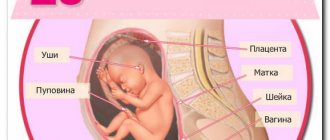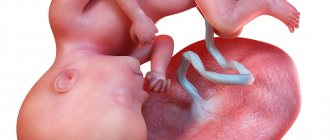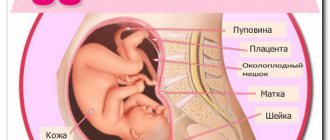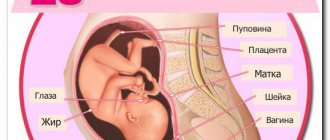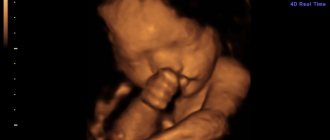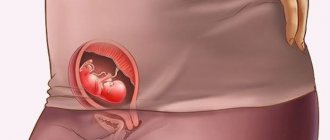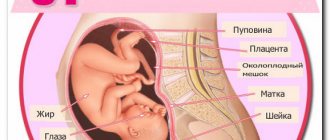Fetal development at 13 weeks of gestation
Fruit size:
10-12 cm.
Fruit weight:
20-30 g.
The 13th obstetric week of pregnancy is an important period in the life of a mother and her unborn baby. The first trimester with all the fears, concerns and ailments associated with toxicosis is already behind us. As a rule, by this time the expectant mother has already registered, passed all the necessary tests and passed the first screening, so now she can breathe a sigh of relief and concentrate her thoughts on the future baby and her motherhood.
13 weeks, how many months is that? The 13th obstetric week ends the first trimester and 3 months of pregnancy (13 weeks = 3 months and 1 day or 91 days of pregnancy).
Why and to whom is ultrasound diagnostics recommended?
If the pregnancy progresses favorably, doctors prescribe 3 scheduled ultrasound examinations for women: one every three months.
For women with chronic diseases or unsuccessful previous pregnancies, ultrasound diagnostics are indicated more often than for the majority of expectant mothers.
In the absence of complications in earlier stages, an ultrasound examination at week 13 may be the first. The doctor will determine the duration of pregnancy, the number of fetuses and their vital signs, assess the condition of the uterus and the ability of the expectant mother to carry the baby to term, confirm or rule out the presence of severe defects.
Ultrasound diagnostic methods
An ultrasound at this stage of pregnancy is necessary not to determine the sex of the baby, but to detect possible pathologies. After all, it is easier to prevent them at an early stage of development than at a later stage. With a detailed photo obtained after an ultrasound, a pregnant woman can consult a specialist without undergoing additional examination. If there is an urgent need, termination of pregnancy at this stage should be performed only by medication.
To obtain the necessary information, the following diagnostic methods are used:
- Transvaginal. This method is considered the most informative in the early stages of pregnancy. If you need to determine the sex of the embryo very early, then it is better to resort to transvaginal diagnosis. Thanks to a special sensor inserted into the vagina, the specialist receives data on the condition of the placenta, cervix, fetus, and its internal organs.
- Abdominal. Carry out in the first, second, third trimesters. It is not prescribed in the early stages, because in this way it is impossible to very accurately examine an embryo that is too small. To pass it at the 13th week of pregnancy, you must fill your bladder.
- 3D ultrasound. Thanks to modern technology, the appearance of the future baby can be seen more clearly. But in the first trimester it is not prescribed due to the short period of development of the baby. It is usually prescribed from the 24th week of pregnancy. From now on, it will be possible to determine the sex of the child with complete accuracy.
;
Mother's condition and how the fetus develops?
At the 13th week of pregnancy, changes occur in a woman’s body: drowsiness and toxicosis disappear, health improves, and an enlargement of the mammary glands is observed. Pain in the lower abdomen may be felt due to an enlarged uterus.
Important! To avoid the threat of pregnancy, if you experience discomfort and brown discharge, you should definitely consult a doctor who is managing your pregnancy!
A natural reaction to changes occurring in the body may be itching in the chest and abdomen. You should not comb it!
By this time, the baby’s organs and systems are formed and actively developing. The size of the head is even larger than the size of the body. The average length of the fruit is 7-8 cm, weight is about 15-30 grams.
The child moves and sucks his finger, his hearing aid can recognize sounds from the outside. The body produces bile and insulin, the baby’s bones become stronger, muscle tissue is formed, and baby teeth begin to grow.
Attention! The expectant mother should forget about bad habits!
The taste of amniotic fluid that the child feels depends on the food the woman eats.
Symptoms
The thirteenth week of pregnancy may be the time when you no longer experience early pregnancy symptoms as the placenta delivers oxygen and nutrients to your baby. You may even feel more like your old self after three months of sleep, nausea, and vomiting. But as you enter the second trimester, you may notice that some pregnancy symptoms increase.
Weight gain
Some women lose weight early in their term but expect to gain more pounds now that you're in your second trimester. Based on your body mass index (BMI) before your new status, here are guidelines for weight gain throughout your pregnancy, according to the American College of Obstetricians and Gynecologists (ACOG):
- If your BMI is underweight (BMI less than 18.5): Your ideal weight gain is between 8 and 18 kilograms throughout your pregnancy. This is about a kilogram (500 to 900 grams) per week for the remaining weeks of your pregnancy.
- If your BMI is normal (BMI 18.5 to 24.9): Your ideal weight gain is a total of 11 to 16 kilograms. This is about a kilogram or a little less (300 to 500 grams) per week for the rest of your pregnancy.
- If your BMI is overweight (BMI 25 to 29.9): Your ideal weight gain is a total of 6 to 11 kilograms. Aim to gain just over half a kilogram (200–400 grams) per week for the remaining weeks of your pregnancy.
- If your BMI is obese (BMI 30 or higher): Your ideal weight gain is around 5-9 kilograms throughout your pregnancy. This is approximately (150 to 300 grams) per week for the rest of your pregnancy.
Be sure to eat healthy. Your baby is growing up fast, and so will you if you're not careful. Weight gain can lead to pregnancy complications such as gestational diabetes and preeclampsia, both of which can compromise the health of you and your baby.
Changes in sexual desire
Some pregnant women experience low sex drive, especially if you are still experiencing first trimester symptoms. But intimacy is possible without sex.
However, there are harbingers who swear that pregnant sex is the best thing they've ever had. Sex during pregnancy doesn't cause miscarriage, but you should still check with your doctor to make sure everything is okay. If you have a history of early labor or miscarriage, we strongly recommend that you speak with your doctor.
Clumsiness
Levels of the hormone relaxin will begin to increase in your body, and this will loosen your ligaments and joints in preparation for childbirth. This should only affect the pelvic area, but it can also affect your entire body.
Increased vaginal discharge
13th week of pregnancy: Having more clear or milky white, odorless vaginal discharge, called leukorrhea, is your body's way of fighting bacteria. Using panty liners should relieve you of discomfort. If your vaginal discharge smells bad, causes more discomfort, or is yellow, greenish, pink, or brown, call your doctor as soon as possible, as it may indicate an infection or may be a sign of preterm labor.
Visible veins
Your body continually produces 50 percent more blood, and your veins increase their workload to deliver blood and oxygen to your baby and other parts of your body. Blue-veined veins on the chest and abdomen prove that there is more blood circulating in your body.
Dizziness
Changes in hormone levels and blood pressure are possible as your body sends more blood to your baby. This is the most common cause of dizziness. Your body now also generates more heat. Try to stay in well-ventilated areas. No sudden movements! Also, eat regular snacks and drink plenty of water.
Bloating, gas and constipation
The contractions of the muscles that normally move food through the intestines are now slower when you are pregnant. Extra iron from your supplements may be a cause of constipation. Drink plenty of water and eat foods rich in fiber. Stay away from foods that cause gas, such as fried foods, broccoli, root vegetables and beans.
Heartburn and indigestion
The muscle valve between the stomach and esophagus has weakened, so heartburn may occur. Your uterus may also have started to press on your stomach. Eat slowly and drink after you eat. Avoid eating spicy and fatty foods.
Food cravings or aversions
Your pregnancy hormones are now balanced, but they won't stop you from disliking or craving certain foods. Your still hypersensitive sense of smell may also influence your food choices, but try to keep it healthy and balanced.
What does the study show?
An ultrasound examination at week 13 allows the doctor to determine how the baby is developing and whether the development of the embryo complies with the norms. And also draw a conclusion about the possibility of spontaneous abortion and the presence of signs of hereditary diseases.
Based on the results of the ultrasound, the doctor can detect the presence of the following anomalies:
- Edwards syndrome. Occurs 1 in 7000 cases. Most often - in children whose mothers are over 35 years old. The study reveals an infrequent fetal heartbeat, one umbilical artery, and the nasal bones are not distinguished.
- Triploidy. The anomaly is accompanied by numerous fetal malformations. Characterized by a triple set of chromosomes.
- Cornelia de Lange syndrome. It is observed in 1 case per 10,000. A hereditary disease in which the patient exhibits growth retardation and mental retardation.
- Smith-Lemli-Opitz syndrome. The disease is associated with metabolic disorders. The result is developmental delay, mental retardation and autism. Occurs in 1 case out of 30,000.
- Down syndrome. One of the most common genetic diseases. It is observed in 1 case in 700 births.
Is it possible to see the gender of the baby?
With a suitable positioning of the baby, it is possible to determine its gender from a photo as early as 13 weeks. His activity can interfere with determining the gender of the child. All that remains is to wait for the next scheduled ultrasound in the second trimester, which will most likely show whether the expectant mother is expecting a boy or a girl.
Purpose of the study
An ultrasound at 13 weeks is one of the mandatory procedures performed after pregnancy registration. The fetus at this stage is no longer so small; its size makes it possible to determine deviations in intrauterine development. The purpose of the scan is to comprehensively assess the condition of the fetus, taking into account blood tests that establish the level of concentration of proteins and hormones that a woman has during pregnancy.
Only taking into account both studies makes it possible to calculate the potential risk of congenital pathology of the fetus. If an ultrasound reveals indicators of the development of Down syndrome, the woman is recommended to undergo a blood test and, if necessary, an analysis of chorion particles is taken, from which the DNA of the embryo is read. In addition, at 13 weeks of pregnancy it is possible to most accurately determine the timing, assess the rate of development and growth of the fetus, determine the presence of problems with pregnancy, and assess the risk of premature birth.
Ultrasound photo 13 weeks
How to prepare for the examination?
Before an ultrasound scan, a woman needs to have a bowel movement to prevent gas formation. A day or two before your appointment, you should exclude from your diet carbonated drinks, dried fruits, plums, cabbage, flour and other products that cause fermentation and gas formation.
Half an hour before an abdominal ultrasound, you need to drink about 0.5 liters of water; before a vaginal ultrasound, you should empty your bladder.
Reference! The mother's anxiety is reflected in the baby's behavior in the womb. Due to excessive worries, the results of the study may be distorted.
Preparing for the ultrasound procedure
Research at thirteen weeks is carried out transabdominally, which does not require special preparation. A few days before the procedure, you should not eat foods that cause gas formation in the intestines. You must have with you a diaper to cover the couch, dry wipes to remove residual acoustic gel from the stomach, and an account card. For examination using transvaginal ultrasound, you need to take a medical condom.
Ultrasound examination is carried out transabdominally or intravaginally. During the procedure, the woman does not experience any bodily discomfort; the procedure is painless. The interpretation of ultrasound indicators is carried out by a diagnostician or a gynecologist.
Screening at 13 weeks of pregnancy: what are the norms?
The first screening raises many questions for the expectant mother. How they do it, what the norms are and what this study should show are some of the main questions.
Screening at week 13 includes: Ultrasound and blood sampling (biochemical analysis). The main task is to determine the presence of chromosomal diseases in the fetus.
Congenital malformations may be indicated by a thickness of the baby's collar zone of more than 3 mm. Suspicions of abnormalities in fetal development (Down syndrome) may arise if the nasal bone is not visible.
According to the results of a blood test from a vein, the main normal indicators at the 13th week of pregnancy are as follows:
- hCG: 14.1 – 114.6;
- RARR-A: 1.02 – 6.03.
The importance of ultrasound diagnostics
Routine ultrasounds must be performed as prescribed by a doctor (first, second, third). Since the 13th week is considered ideal for the first screening, do not miss it. Ultrasound diagnostics not only allows the mother to see the baby for the first time and later find out its gender, but also shows doctors whether the development of the embryo complies with established standards and the presence of pathologies that are sometimes incompatible with life.
Unscheduled ultrasound may be prescribed in the following cases:
- Suspicion of a frozen pregnancy;
- Risk of miscarriage;
- Hereditary pathologies;
- Anembryony;
- Congenital pathologies.
What can be seen in the photo of the fetus?
In the picture you can already see the outlines of all parts of the body (not very clear), including the baby’s facial features.
In the photo at 12, 13 weeks, the fetus already looks like a baby, only very small. The head already corresponds to the size in relation to the body. Tiny fingers can be seen on the arms and legs.
If the position of the fetus is successful during the examination, it will be possible to see the genitals and find out the sex of the child. The baby may grimace, and if you're lucky, the photo will capture the moment he yawns or smiles.
Photo of a boy
Photo of a girl
What do the results of the first screening say?
Based on the results of the first screening, the pregnant woman is informed whether there are any deviations from the normative values. If they are present, there is an increased risk of chromosomal pathology of the fetus. Prenatal screening calculates the risks of pathologies such as Down syndrome, Patau syndrome, Edwards syndrome, neural tube defect and others.
However, if the results are poor, the baby may be healthy. And this can only serve as a basis for further examination, including invasive procedures such as amniocentesis and chorionic villus biopsy. When performing these examination methods, the chromosome set of the fetus is determined.
At the same time, obtaining excellent screening results does not guarantee the absence of pathology. And therefore, all women need to undergo a second screening, which examines organ pathology in more detail, and also checks again the risk of chromosomal abnormalities.
Decoding the norm
During the study, the following indicators are assessed:
- fetal heart rate (FHR);
- coccygeal-parietal fetal size (CTF);
- collar space thickness (TNT);
- biparietal fetal size (BFS);
- abdominal circumference;
- length of the nasal bone;
- thigh length.
Table: normal indicators for week 13
| Index | Norm |
| Heart rate | 147-171 beats/min |
| KTR | 62-73 mm |
| TVP | 1.7-2.7 mm |
| BPR | 20-28 mm |
| Abdominal circumference | 58-80 mm |
| Nasal bone length | 3-4.2 mm |
| Thigh length | 7-11.8 mm |

